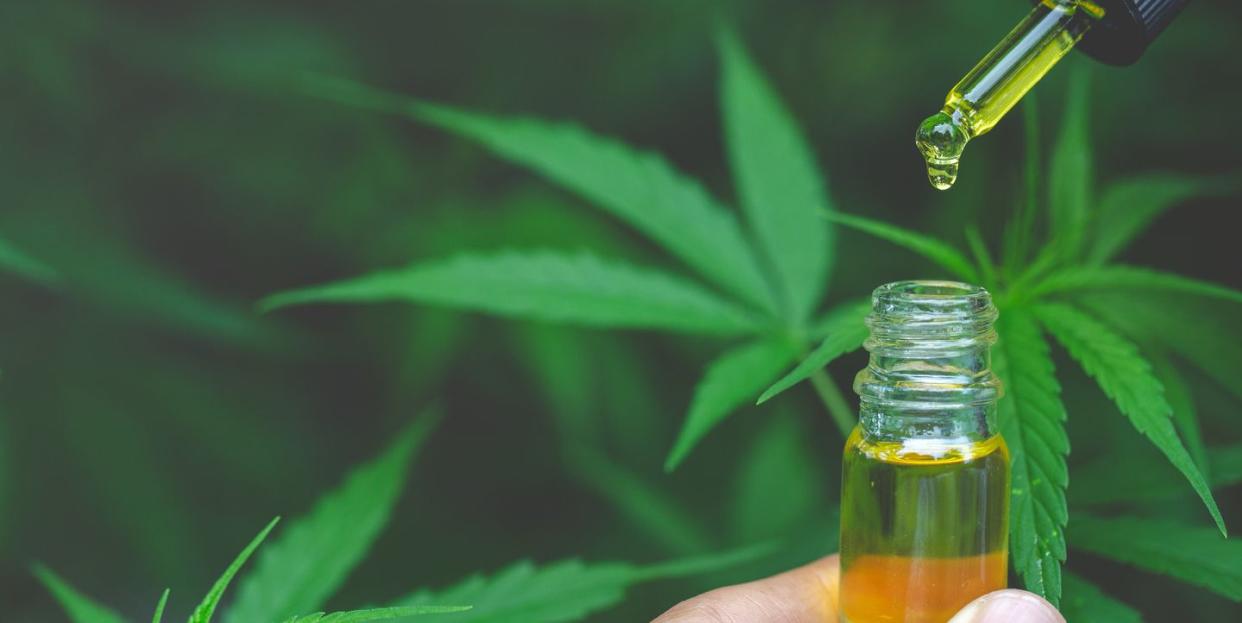Love CBD? Then You Need To Get Caught Up On CBG, The Next Buzzy Cannabinoid

If you tend to be up on all the latest wellness trends, you’re probably no stranger to the many forms of CBD that have popped up on the market over the last few years. And while CBD oils, creams, and capsules are still all the rage when it comes to healing and relaxation, it turns out there may be a more powerful compound gaining buzz known as CBG, which is found in very low concentrations in mature cannabis flowers.
Why the CBG hype? It may have to do with the fact that there is an increased understanding of cannabis and cannabinoids these days, according to Jeremy Riggle, PhD, a cannabis researcher and chief scientist at Mary's Medicinals and Mary's Nutritionals in Denver. As a result, all of this cannabis research and exploration has introduced scientists to many new cannabinoids besides the more well-known THC and CBD. Additionally, advances in extraction and isolation technologies have allowed researchers to be able to isolate many cannabinoids including CBG, which was not possible or common just a few years ago.
Now, let's dig into what CBG is exactly, as well as its possible benefits. (Keep in mind, the research on various cannabinoids is far from conclusive—so take everything you hear about CBG *and* CBD with a grain of salt.)
First, what even are cannabinoids?
Cannabinoids (also referred to as phytocannabinoids) are natural products, as phytochemicals are present in the cannabis plant, explains Navindra P. Seeram, PhD, a professor of biomedical and pharmaceutical sciences at the University of Rhode Island College of Pharmacy. Over 100 phytocannabinoids have been identified in cannabis as well as other phytochemicals, including terpenoids and flavonoids. This is similar to other plants, such as green tea, which contains many phytochemicals, he says.
Some of the more well-known cannabinoids include:
Tetrahydrocannabinol (THC), which is the psychoactive compound in cannabis
Cannabidiol (CBD)
Cannabinol (CBN)
Cannabigerol (CBG)
Cannabichromene (CBC)
A key aspect of these compounds is that they have been found to be very active pharmacologically, meaning that they interact with a number of different receptor systems in the human body, Riggle explains. These systems are involved in nearly every aspect of human physiology from metabolism to pain perception.
For example, the endocannabinoid system, which everyone has, consists of CB1 (found in the central nervous system) and CB2 (found in the immune system) receptors and associated enzymes, and interacts to a significant degree with cannabinoids. “This is much the same way pharmaceutical drugs work, by interacting with receptor systems or enzymes to initiate a specific health outcome,” says Riggle.
So what's all this hype about CBG in particular?
CBG is short for cannabigerol and has been one of the newest areas of research in the cannabis space, says José Torradas, MD, an emergency physician who studies alternative therapies in Langhorne, Pennsylvania.
Although CBG also acts on both CB1 and CB2 receptors, it doesn't have the same psychoactive effect as THC. In fact, researchers believe it may help mitigate the paranoia or anxiety sometimes reported by patients who use high THC-containing products, Dr. Torradas says.
So CBG is *not* the same thing as CBD then?
Not exactly—CBG is essentially the “parent” cannabinoid, meaning that every other cannabinoid starts out as CBG and then eventually converts to other cannabinoids like THC or CBD, Riggle explains.
“In terms of how well it connects to CB1 and CB2 receptors, CBG seems to be much more effective and direct than CBD,” says Dr. Torradas. “Similarly to CBD, CBG does not have psychoactive effects (meaning it won't get you high).”
What are the potential benefits of CBG?
There have been some early studies suggesting CBG might be successful as a potential antibiotic against MRSA, as well as for pain and inflammation reduction and even in slowing the growth of cancer cells, Dr. Torradas notes. Its effects, however, have not yet been studied in adults, so it’s important to take this research with a grain of salt.
However, preliminary animal and pre-clinical research has suggested that CBG may be helpful in treating the following conditions:
Inflammatory bowel disease such as Crohn's disease or ulcerative colitis
Movement disorders like multiple sclerosis, Parkinson's disease, and Huntington's disease
Anxiety disorders
"CBG [research] is in the early stages," says Dr. Torradas. "More robust research and data is needed and lowering the cost of extraction would help unlock the keys to CBG's future adoption if these early indications are true," says Dr. Torradas.
You will likely see CBG listed as an ingredient in some oils and tinctures on the market, but keep in mind that there's a major lack of regulation of CBD and CBG products in general, so it's kind of impossible to know what you're really getting in any product of this kind. Because there is very limited research, it's also tough to determine how a CBG product would interact with various medications, as well as what side effects it may cause.
The bottom line: We’ll need to wait to know for certain if CBG provides true health benefits, but so far, the preliminary research sounds promising.
You Might Also Like

